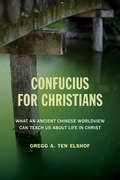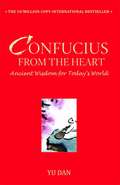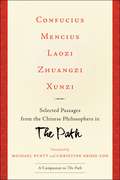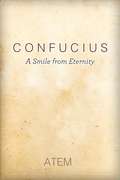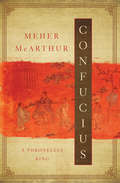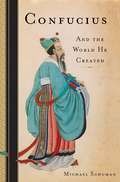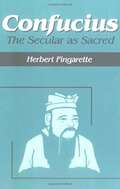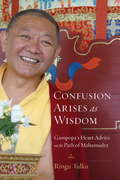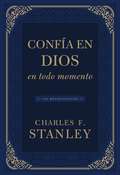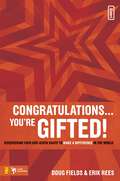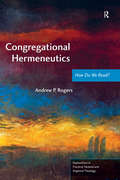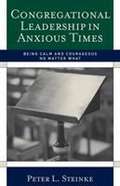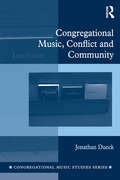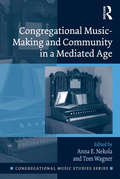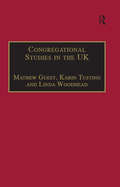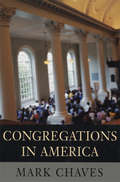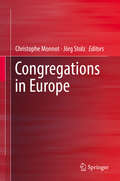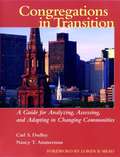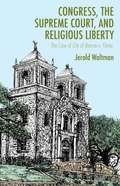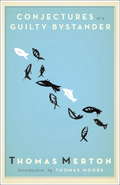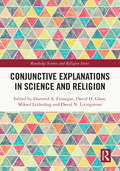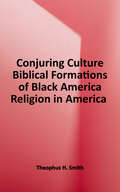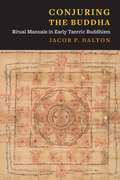- Table View
- List View
Confucius for Christians: What an Ancient Chinese Worldview Can Teach Us about Life in Christ
by Gregg A. Ten ElshofShows how wisdom from an Eastern tradition can enrich the lives of Jesus followers everywhere This unique book explores ways of using resources from the Confucian wisdom tradition to inform Christian living. Neither highlighting nor diminishing the differences between Confucianism and Christianity, Gregg Ten Elshof reflects on questions and issues in the Christian life with the Confucian worldview in mind. In examining such subjects as family, learning, and ethics, Ten Elshof sets the typical Western worldview against the Confucian worldview and considers how each worldview lines up with the teachings of Jesus. Pointing to much that is good and helpful in the Confucian tradition, Ten Elshof shows how reflection on the teachings of Confucius can inspire a deeper and richer understanding of what it really means to live the Jesus way.
Confucius from the Heart
by Esther Tyldesley Yu DanThis book is a compilation of teachings - called 'Analects' - written by Confucius's students after his death.The author has also incorporated some of her own experiences and stories.
Confucius, Mencius, Laozi, Zhuangzi, Xunzi: Selected Passages from the Chinese Philosophers in The Path
by Christine Gross-Loh Michael PuettAn ebook companion to The Path by Michael Puett and Christine Gross-Loh that puts together a broad selection of translated excerpts from the ancient works of Chinese philosophy discussed in the book.This free ebook gives readers a chance to deepen their understanding of The Path by Michael Puett & Christine Gross-Loh by reading translated excerpts from the original works of Chinese philosophy discussed in the book. It includes selections from the teachings of Confucius, the Mohists, Mencius, Laozi, Zhuangzi, and Xunzi, among others.
Confucius: A Smile from Eternity
by Atem“When Tsze sat himself down upon a big rock, he said to the Earth:‘Why is it that you are always so hard to manage?’And the Earth said to Tsze:‘Because the Great One created me so that you might learn your lessons.’”Confucius is the Latin name of the great Chinese philosopher Chung-Fu-Tsze. As the Chinese empire was crumbling, Confucius used his erudition and great wisdom to establish order amidst the political and social chaos.He believed in the integrity of law and tradition, and that inner knowledge had to be activated so that virtue, order, and harmony could be suffused into society. For centuries his philosophy has been the foundation of Chinese society.His wisdom is reflected in this series of channelled quotes that capture the humour, profundity, and exquisite simplicity of existence.“The greatest lessons are learned in the stillness of one’s own self.”
Confucius: A Throneless King
by Meher McarthurAn illuminating portrait of Confucius's life and philosophical teachings Confucius is one of the most important figures in Chinese history, a man whose philosophies have shaped world culture. Often overlooked outside his native country, Confucius himself was a fascinating figure. A contemporary of Buddha, Confucius was an outspoken and uncompromising man who revolutionized Chinese society nearly 2,500 years ago, when the country was merely a loose web of feudal provinces. No small feat for the illegitimate son of a retired soldier and a teenage concubine who once received a prophecy from the local fortune-teller that she would give birth to a "throneless king." Perhaps because of these humble beginnings, Confucius had a passionate belief in respect for others and this belief underpinned his life and teachings. He advised the emperors and kings of his day, gaining both their respect and undying enmity. He was equally proud of both achievements, saying that if the evil people of the world liked him, he was doing something wrong. In this enlightening portrait of a great man, the reader will discover how Confucius's theories became the foundation of social structures throughout Asia that still exist today.
Confucius: And the World He Created
by Michael SchumanConfucius is perhaps the most important philosopher in history. Today, his teachings shape the daily lives of more than 1. 6 billion people. Throughout East Asia, Confucius’s influence can be seen in everything from business practices and family relationships to educational standards and government policies. Even as western ideas from Christianity to Communism have bombarded the region, Confucius’s doctrine has endured as the foundation of East Asian culture. It is impossible to understand East Asia, journalist Michael Schuman demonstrates, without first engaging with Confucius and his vast legacy. Confucius created a worldview that is in many respects distinct from, and in conflict with, Western culture. As Schuman shows, the way that East Asian companies are managed, how family members interact with each other, and how governments see their role in society all differ from the norm in the West due to Confucius’s lasting impact. Confucius has been credited with giving East Asia an advantage in today’s world, by instilling its people with a devotion to learning, and propelling the region’s economic progress. Still, the sage has also been highly controversial. For the past 100 years, East Asians have questioned if the region can become truly modern while Confucius remains so entrenched in society. He has been criticized for causing the inequality of women, promoting authoritarian regimes, and suppressing human rights. Despite these debates, East Asians today are turning to Confucius to help them solve the ills of modern life more than they have in a century. As a wealthy and increasingly powerful Asia rises on the world stage, Confucius, too, will command a more prominent place in global culture. Touching on philosophy, history, and current affairs, Confucius tells the vivid, dramatic story of the enigmatic philosopher whose ideas remain at the heart of East Asian civilization.
Confucius: The Secular As Sacred
by Herbert FingaretteAn ideal way to discover the teachings of Confucius! Fingarette's primary aim is to help readers discover what is distinctive in Confucius and to learn what he can teach us. Fingarette-who thinks the best way to discover Confucius's teaching is by taking him at his word-uses original text as his principal resource in an effort to try to see what it says, what it implies and what it does not say or need not imply.
Confusion Arises as Wisdom: Gampopa's Heart Advice on the Path of Mahamudra
by Ringu TulkuThe Tibetan Buddhist teachings on the freedom that comes from perceiving the emptiness of all phenomena--teachings known collectively by the name Mahamudra--are presented here with remarkable clarity through commentary on a twelfth-century text. The text is "Gampopa's Great Teachings to the Assembly," by Gampopa, the foremost disciple of the legendary figure Milarepa and founder of Tibetan Buddhism's Kagyu school. The commentary is by Ringu Tulku Rinpoche, a contemporary teacher of deep learning and profound practice with a remarkable gift for presenting these traditional teachings in a way that is accessible to Western hearts and minds.Gampopa in his teaching combined the general Mahayana teachings he received from the Kadampa tradition of Atisha with the quintessential Vajrayana teachings, which he received from his teacher, Milarepa. These became the basis of the Kagyu lineage teachings that he founded. This particular text, which includes both Mahayana and Vajrayana teachings, is representative of the classic teachings of the Kagyu tradition in general.
Confía en Dios en todo momento: 365 devocionales (Devotionals from Charles F. Stanley)
by Charles F. StanleyEste devocional de 365 días del querido autor y pastor Dr. Charles Stanley te inspirará para ver cómo Dios transforma nuestros corazones y nuestras vidas cuando confiamos en Él con un futuro desconocido. Confiar en Dios en tiempos difíciles puede ser un reto, pero trabajar para hacer crecer esa confianza día a día nos proporciona una alegría y una paz mayores de las que jamás podríamos encontrar apoyándonos en nuestro propio entendimiento. En Confía en Dios en todo momento, el Dr. Charles Stanley nos anima a creer en el amor de Dios y a descansar en Su propósito para nosotros.Cada entrada de este devocional diario incluye un versículo bíblico, una oración y una enseñanza inspiradora. Página a página, tu alma encontrará descanso al recordar que:No importa lo que ocurra en el mundo o en tu vida, Dios es fielPuedes liberarte de la ansiedad y descansar en Dios cuando dejes de intentar resolverlo todo por ti mismoConfiar en Dios día a día te lleva al contentamiento y la satisfacción mientras Él endereza tus caminosConfía en Dios en todo momento es un regalo maravilloso para Navidad, Pascua, cumpleaños y graduaciones, o para cualquiera que anhele confiar en Dios más profundamente en un mundo incierto hoy y todos los días.Trusting God With TodayThis 365-day devotional from beloved author and pastor Dr. Charles Stanley will inspire you to see how God transforms our hearts and lives when we trust Him with an unknown future.Trusting God in difficult times can be a challenge, but working to grow that trust day by day brings greater joy and peace than we could ever find leaning on our own understanding. In Trusting God with Today, Dr. Charles Stanley encourages us to believe in God's love and rest in His purpose for us.Each entry in this daily devotional includes a Bible verse, a prayer, and inspirational teaching. Page by page, your soul will find rest as you remember that:No matter what is happening in the world or in your life, God is faithfulYou can release anxiety and embrace God's rest as you stop trying to figure it all out yourselfTrusting God one day at a time leads to contentment and satisfaction as He makes your paths straightTrusting God with Today makes a wonderful gift for Christmas, Easter, birthdays, and graduations, or for anyone who longs to trust God more deeply in an uncertain world today and every day.
Congratulations...You're Gifted! Discovering Your God-given Shape to Make a Difference in the World: Discovering Your God-Given Shape to Make a Difference in the World (invert)
by Erik Rees Doug FieldsBased on the popular S. H. A. P. E. book for adults, this teen version walks through the same process of discovery with students. Written by the bestselling author and pastor at Saddleback Church, Doug Fields, this book will help teenagers understand who they are, how they can serve, and why they serve.
Congregational Hermeneutics: How Do We Read? (Explorations in Practical, Pastoral and Empirical Theology)
by Andrew P. RogersDespite many churches claiming that the Bible is highly significant for their doctrine and practice, questions about how we read the Bible are rarely made explicit. Based on ethnographic research in English churches, Congregational Hermeneutics explores this dissonance and moves beyond descriptions to propose ways of enriching hermeneutical practices in congregations. Characterised as hermeneutical apprenticeship, this is not just a matter of learning certain skills, but of cultivating hermeneutical virtues such as faithfulness, community, humility, confidence and courage. These virtues are given substance through looking at four broad themes that emerge from the analysis of congregational hermeneutics - tradition, practices, epistemology and mediation. Concluding with what hermeneutical apprenticeship might look like in practice, this book is constructively theological about what churches actually do with the Bible, and will be of interest to scholars, students and practitioners.
Congregational Leadership in Anxious Times: Being Calm and Courageous No Matter What
by Peter L. SteinkeAnxious times call for steady leadership. When tensions emerge in a congregation, its leaders cannot be as anxious as the people they serve. To remain effective, congregational leaders must control their own uneasiness. This takes self-awareness and confidence to manage relationships and influence behaviors. In this book, Peter Steinke goes deeper into the requirements of effective congregational leadership. This new volume will both enlighten and embolden leaders. Steinke inspires courage in leaders to maintain the course, unearth secrets, resist sabotage, withstand fury, and overcome timidity or doubts. His insights, illustrations, and provocations will carry leaders through rough times, provide clarity during confusing times, and uplift them in joyous times.
Congregational Music, Conflict and Community (Congregational Music Studies Series)
by Jonathan DueckCongregational Music, Conflict and Community is the first study of the music of the contemporary 'worship wars' – conflicts over church music that continue to animate and divide Protestants today – to be based on long-term in-person observation and interviews. It tells the story of the musical lives of three Canadian Mennonite congregations, who sang together despite their musical differences at the height of these debates in the late 1990s and early 2000s. Mennonites are among the most music-centered Christian groups in North America, and each congregation felt deeply about the music they chose as their own. The congregations studied span the spectrum from traditional to blended to contemporary worship styles, and from evangelical to liberal Protestant theologies. At their core, the book argues, worship wars are not fought in order to please congregants' musical tastes nor to satisfy the theological principles held by a denomination. Instead, the relationships and meanings shaped through individuals’ experiences singing in the particular ways afforded by each style of worship are most profoundly at stake in the worship wars. As such, this book will be of keen interest to scholars working across the fields of religious studies and ethnomusicology.
Congregational Music-Making and Community in a Mediated Age: Singing A New Song (Congregational Music Studies Series)
by Tom Wagner Anna E. NekolaCongregational music can be an act of praise, a vehicle for theology, an action of embodied community, as well as a means to a divine encounter. This multidisciplinary anthology approaches congregational music as media in the widest sense - as a multivalent communication action with technological, commercial, political, ideological and theological implications, where processes of mediated communication produce shared worlds and beliefs. Bringing together a range of voices, promoting dialogue across a range of disciplines, each author approaches the topic of congregational music from his or her own perspective, facilitating cross-disciplinary connections while also showcasing a diversity of outlooks on the roles that music and media play in Christian experience. The authors break important new ground in understanding the ways that music, media and religious belief and praxis become ’lived theology’ in our media age, revealing the rich and diverse ways that people are living, experiencing and negotiating faith and community through music.
Congregational Studies in the UK: Christianity in a Post-Christian Context (Explorations in Practical, Pastoral and Empirical Theology)
by Karin TustingThis book presents the first comprehensive introduction to congregational studies in the UK. Through a series of innovative essays, it explores the difference that the increasingly post-Christian nature of British society is making to life in Christian congregations, and compares this to the very different scenario which exists in the USA. Contributions from leading scholars in the field include rich case studies of local communities and theoretical analyses which reflect on issues of method and develop broader understandings. Congregational studies is revealed as a rich and growing field of interest to scholars across many disciplines and to those involved in congregational life.
Congregations in America
by Mark ChavesMore Americans belong to religious congregations than to any other kind of voluntary association. What these vast numbers amount to--what people are doing in the over 300,000 churches, synagogues, mosques, and temples in the United States--is a question that resonates through every quarter of American society, particularly in these times of "faith-based initiatives," "moral majorities," and militant fundamentalism. And it is a question answered in depth and in detail in Congregations in America. Drawing on the 1998 National Congregations Study--the first systematic study of its kind--as well as a broad range of quantitative, qualitative, and historical evidence, this book provides a comprehensive overview of the most significant form of collective religious expression in American society: local congregations. Among its more surprising findings, Congregations in America reveals that, despite the media focus on the political and social activities of religious groups, the arts are actually far more central to the workings of congregations. Here we see how, far from emphasizing the pursuit of charity or justice through social services or politics, congregations mainly traffic in ritual, knowledge, and beauty through the cultural activities of worship, religious education, and the arts. Along with clarifying--and debunking--arguments on both sides of the debate over faith-based initiatives, the information presented here comprises a unique and invaluable resource, answering previously unanswerable questions about the size, nature, make-up, finances, activities, and proclivities of these organizations at the very center of American life.
Congregations in Europe
by Christophe Monnot Jörg StolzThis volume describes and maps congregations of Christian confessions and denominations, as well as groups with Jewish, Buddhist, Muslim, Hindu, and various other spiritual faiths, in different European countries. Consisting of three parts, it presents concrete sociological studies addressing how established and not established, old and new congregations of various faiths create a new kind of religious diversity at the country level; how religious congregations are challenged and thrive in large cities; and how religious congregations change in the 21st century. The book enlightens by its descriptive analysis and the theoretical questions it raises concerning the religious transformations happening all over Europe. It addresses issues of religious diversity in the cities of Europe by presenting large studies conducted in cities such as Barcelona in Spain, and Aarhus in Denmark. By means of large-scale censuses taken in areas such as North Rhine-Westphalia in Germany and in countries like Switzerland and Italy, the book shows how the historically established churches restructure their congregations and activities. It clarifies for the new gatherers where and how a new diversity of religious congregations is in the process of being established. Finally, the book covers two important topical issues: pluralisation and secularisation. It provides new data on religious diversity, painting a new picture of secularisation: the impact and structural consequences of the long-term decrease of membership in the established churches.
Congregations in Transition: A Guide for Analyzing, Assessing, and Adapting in Changing Communities
by Carl S. Dudley Nancy T. AmmermanThis hands-on guide helps congregations meet the reality and challenges of today's constantly changing urban and suburban church communities. Congregations in Transition, written in an easy-to-follow workbook format, is designed to help communities of faith focus on the changing needs of their members and explore the opportunities and options open to them.
Congress, the Supreme Court, and Religious Liberty
by Jerold WaltmanIn the case City of Boerne v. Flores, the Supreme Court struck down the Religious Freedom Restoration Act of 1993. Waltman offers the first book-length analysis of the act to show how this case contributes to an intense legal debate still ongoing today: Can and should the Supreme Court be the exclusive interpreter of the Constitution?
Conjectures of a Guilty Bystander
by Thomas MertonIn this series of notes, opinions, experiences, and reflections, Thomas Merton examines some of the most urgent questions of our age. With his characteristic forcefulness and candor, he brings the reader face-to-face with such provocative and controversial issues as the “death of God,” politics, modern life and values, and racial strife–issues that are as relevant today as they were fifty years ago. Conjectures of a Guilty Bystanderis Merton at his best–detached but not unpassionate, humorous yet sensitive, at all times alive and searching, with a gift for language which has made him one of the most widely read and influential spiritual writers of our time.
Conjectures of a Guilty Bystander
by Thomas Moore Thomas MertonIn this series of notes, opinions, experiences, and reflections, Thomas Merton examines some of the most urgent questions of our age. With his characteristic forcefulness and candor, he brings the reader face-to-face with such provocative and controversial issues as the "death of God," politics, modern life and values, and racial strife-issues that are as relevant today as they were fifty years ago. Conjectures of a Guilty Bystander is Merton at his best-detached but not unpassionate, humorous yet sensitive, at all times alive and searching, with a gift for language which has made him one of the most widely read and influential spiritual writers of our time.From the Trade Paperback edition.
Conjectures of a Guilty Bystander
by Thomas Moore Thomas MertonIn this series of notes, opinions, experiences, and reflections, Thomas Merton examines some of the most urgent questions of our age. With his characteristic forcefulness and candor, he brings the reader face-to-face with such provocative and controversial issues as the "death of God," politics, modern life and values, and racial strife-issues that are as relevant today as they were fifty years ago. Conjectures of a Guilty Bystander is Merton at his best-detached but not unpassionate, humorous yet sensitive, at all times alive and searching, with a gift for language which has made him one of the most widely read and influential spiritual writers of our time.From the Trade Paperback edition.
Conjunctive Explanations in Science and Religion (Routledge Science and Religion Series)
by David N. Livingstone David H. Glass Mikael LeidenhagThis book investigates the nature and relevance of conjunctive explanations in the context of science and religion. It explores questions concerning how scientific and religious explanations for features of the world or phenomena within it relate to each other and whether they might work together in mutually enriching ways. The chapters address topics including the relationship between Darwinian and teleological explanations, non-reductive explanations of mind and consciousness, and explanations of Christian faith and religious experience, while others explore theological and philosophical issues concerning the nature and feasibility of conjunctive explanations. Overall, the contributions help to provide conceptual clarity on how scientific and religious explanations might or might not work together conjunctively as well as exploring how these ideas relate to specific topics in science and religion more generally.
Conjuring Culture: Biblical Formations of Black America (Religion In America Ser.)
by Theophus H. SmithThis book provides a sophisticated new interdisciplinary interpretation of the formulation and evolution of African American religion and culture. <p><p>Theophus Smith argues for the central importance of "conjure"—a magical means of transforming reality—in black spirituality and culture. Smith shows that the Bible, the sacred text of Western civilization, has in fact functioned as a magical formulary for African Americans. <p><p>Going back to slave religion, and continuing in black folk practice and literature to the present day, the Bible has provided African Americans with ritual prescriptions for prophetically re-envisioning, and thereby transforming, their history and culture. In effect, the Bible is a "conjure book" for prescribing cures and curses, and for invoking extraordinary and Divine powers to effect changes in the conditions of human existence—and to bring about justice and freedom. Biblical themes, symbols, and figures like Moses, the Exodus, the Promised Land, and the Suffering Servant, as deployed by African Americans, have crucially formed and reformed not only black culture but American society as a whole. <p><p>Smith examines not only the religious and political uses of conjure, but its influence on black aesthetics, in music, drama, folklore, and literature. The concept of conjure, he shows, is at the heart of indigenous and still vital spirituality, with exciting implications for reformulating the next generation of black studies and black theology. Even more broadly, Smith proposes, "conjuring culture" can function as a new paradigm for understanding Western religious and cultural phenomena generally.
Conjuring the Buddha: Ritual Manuals in Early Tantric Buddhism
by Jacob P. DaltonRitual manuals are among the most common and most personal forms of Buddhist literature. Since at least the late fifth century, individual practitioners—including monks, nuns, teachers, disciples, and laypeople—have kept texts describing how to perform the daily rites. These manuals represent an intimate counterpart to the canonical sutras and the tantras, speaking to the lived experience of Buddhist practice.Conjuring the Buddha offers a history of early tantric Buddhist ritual through the lens of the Tibetan manuscripts discovered near Dunhuang on the ancient Silk Road. Jacob P. Dalton argues that the spread of ritual manuals offered Buddhists an extracanonical literary form through which to engage with their tradition in new and locally specific ways. He suggests that ritual manuals were the literary precursors to the tantras, crucial to the emergence of esoteric Buddhism. Examining a series of ninth- and tenth-century tantric manuals from Dunhuang, Dalton uncovers lost moments in the development of rituals such as consecration, possession, sexual yoga, the Great Perfection, and the subtle body practices of the winds and channels. He also traces the use of poetic language in ritual manuals, showing how at pivotal moments, metaphor, simile, rhythm, and rhyme were deployed to evoke carefully sculpted affective experiences. Offering an unprecedented glimpse into the personal practice of early tantric Buddhists, Conjuring the Buddha provides new insight into the origins and development of the tantric tradition.
